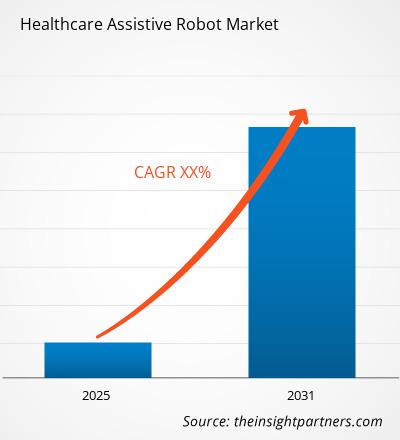An assistive robot is a device that can sense, process sensory information, and perform actions that benefit, people with disabilities and seniors. The assistive robot performs a physical task for the well-being of a person with a disability. The task is embedded in the context of normal human activities of daily living (ADLs) and would otherwise have to be performed by an attendant healthcare assistive robots. In the recent years, these robots have been revolutionizing the eldercare industry.
The healthcare assistive robot market is anticipated to grow with a significant rate in the coming years, owing to Rising funding for research on robotics technology, increasing incidence of stroke worldwide, and rapidly implementation of technology in healthcare industry are drive the market. Due to growing awareness coupled with increasing efforts to promote robotic research will fuel business growth, and favorable government regulations have boosted the healthcare assistive robots market. Therefore, healthcare assistive robots market has expected lucrative growth opportunity in forecast period.
The “Global Healthcare Assistive Robot Market Analysis to 2031” is a specialized and in-depth study of the medical device industry with a focus on the global market trend. The report aims to provide an overview of global healthcare assistive robot with detailed market segmentation by product, portability, application and geography. The global healthcare assistive robot is expected to witness high growth during the forecast period. The healthcare assistive robot market report provides key statistics on the market status of the leading market players and offers key trends and opportunities in the market.
The global healthcare assistive robot market is segmented on the basis of product, portability, and application. The product segment includes, humanoid, rehabilitative robots, surveillance and security robots, and socially assistive robots. Based on portability, the healthcare assistive robot market is segmented as, mobile and fixed. The market based on the application is classified as, stroke, cognitive and motor skills, orthopedics, sports, and other applications.
The healthcare assistive robot market report provides a detailed overview of the industry including both qualitative and quantitative information. Healthcare assistive robot market report provides overview and forecast of the global healthcare assistive robot based on product, portability, and application. It also provides market size and forecast till 2031 for overall healthcare assistive robot with respect to five major regions, namely; North America, Europe, Asia-Pacific (APAC), Middle East and Africa (MEA) and South & Central America. The market by each region is later sub-segmented by respective countries and segments. The healthcare assistive robot market report covers analysis and forecast of 13 counties globally along with current trend and opportunities prevailing in the region.
North America held the largest share and is expected to dominate healthcare assistive robot market for healthcare assistive robots over the forecast period. Favorable government initiatives, improved awareness and growing adoption of technologically advanced products are expected to be the key factors for the market growth. However, Asia Pacific is expected to grow at the fastest rate in healthcare assistive robot market owing to presence of large pool of geriatric population and rising adoption of assistive robots in Japan.
The healthcare assistive robot market report analyzes factors affecting market from both demand and supply side and further evaluates market dynamics effecting the market during the forecast period i.e., drivers, restraints, opportunities, and future trend. The report also provides exhaustive PEST analysis for all five regions namely; North America, Europe, APAC, MEA and South & Central America after evaluating political, economic, social and technological factors effecting the market in these regions.
The healthcare assistive robot market report also includes the profiles of key healthcare assistive robot manufacturing companies along with their SWOT analysis and market strategies. In addition, the report focuses on leading industry players with information such as company profiles, products and services offered, financial information of last 3 years, key development in past five years. Some of the key players influencing the market are Barrett Technology, CYBERDYNE INC., Auris Health, Inc., Honda Motor Co., Ltd., Kinova Inc., KUKA AG, Ekso Bionics, GaitTronics Inc, Hocoma, and ReWalk Robotics among others.
Healthcare Assistive Robot Report Scope
| Report Attribute | Details |
|---|---|
| Market size in 2024 | US$ XX million |
| Market Size by 2031 | US$ XX Million |
| Global CAGR (2025 - 2031) | XX% |
| Historical Data | 2021-2023 |
| Forecast period | 2025-2031 |
| Segments Covered |
By Product
|
| Regions and Countries Covered | North America
|
| Market leaders and key company profiles |
- Historical Analysis (2 Years), Base Year, Forecast (7 Years) with CAGR
- PEST and SWOT Analysis
- Market Size Value / Volume - Global, Regional, Country
- Industry and Competitive Landscape
- Excel Dataset


- Single Pair Ethernet Market
- Organoids Market
- Power Bank Market
- Grant Management Software Market
- Lymphedema Treatment Market
- Lyophilization Services for Biopharmaceuticals Market
- Arterial Blood Gas Kits Market
- Emergency Department Information System (EDIS) Market
- Print Management Software Market
- Webbing Market

Report Coverage
Revenue forecast, Company Analysis, Industry landscape, Growth factors, and Trends

Segment Covered
This text is related
to segments covered.

Regional Scope
North America, Europe, Asia Pacific, Middle East & Africa, South & Central America

Country Scope
This text is related
to country scope.
Trends and growth analysis reports related to Life Sciences : READ MORE..
The List of Companies
1. Barrett Technology
2. CYBERDYNE INC.
3. Auris Health, Inc.
4. Honda Motor Co., Ltd.
5. Kinova Inc.
6. KUKA AG
7. Ekso Bionics
8. GaitTronics Inc
9. Hocoma
10. ReWalk Robotics

 Get Free Sample For
Get Free Sample For